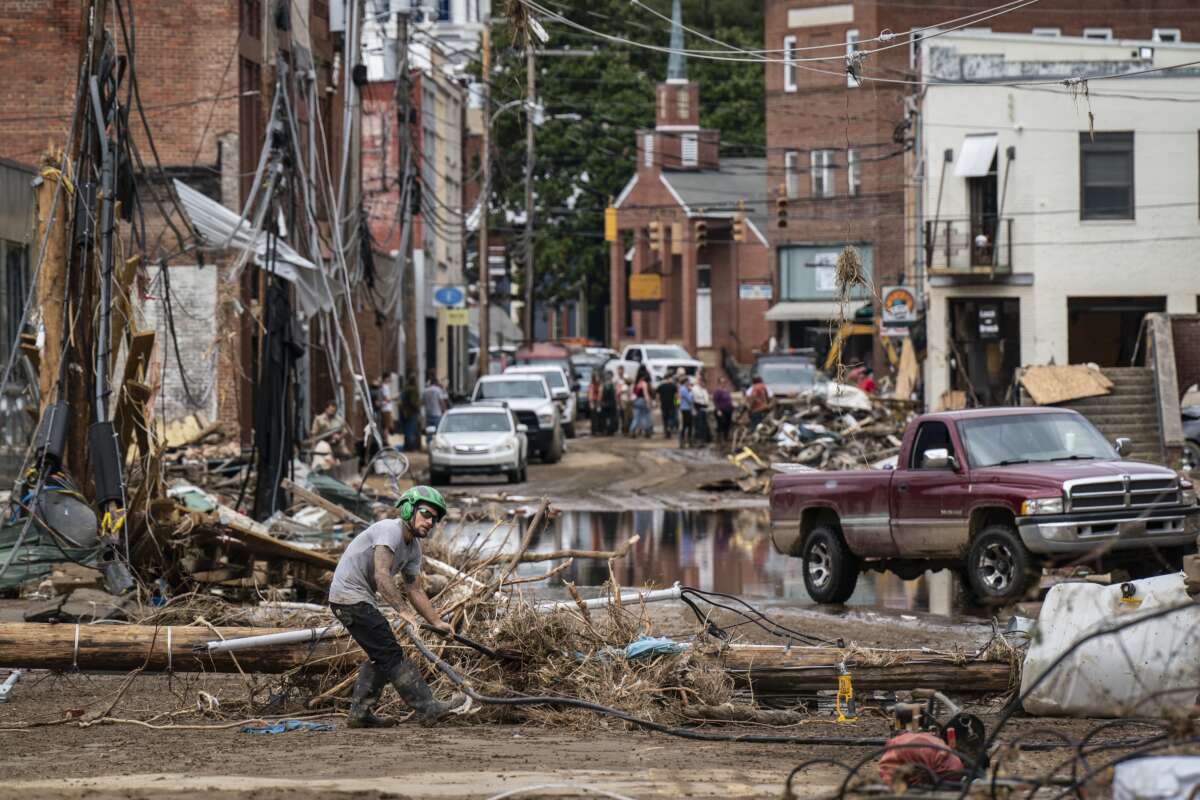Truthout is a vital news source and a living history of political struggle. If you think our work is valuable, support us with a donation of any size.
This year’s hurricane season has been devastating.
Hurricane Helene left a trail of wreckage across the Southeast and Appalachia, where over 230 people have died so far. Barely two weeks later, Milton slammed into Florida, killing dozens more, destroying homes, and leaving over a million people without power. Insurers are predicting that losses from Milton could reach $60 billion.
Everyone suffers in a disaster, but the most vulnerable suffer the most. And our government’s warped priorities can often make that worse.
When people are told to evacuate but not provided any assistance, people without vehicles — disproportionately low-income, unemployed, young, and Black — are stranded. Homeowners recoup some losses through insurance, but renters are left without housing if their home is destroyed.
Low-wage workers, who often have no paid leave, lose their paychecks when their workplaces close, even though they’re the very people who can least afford it. They’re sometimes even forced to keep working in dangerous conditions — which reportedly happened at a plastics factory in Tennessee, where some workers died as a result.
Appalachia, which bore the brunt of Helene’s impact, is among the poorest regions in the country, with a median household income almost 18 percent below the national figure and poverty rates above 30 percent in some counties. Many people who’ve lost their homes and livelihoods lack the resources to fall back on in an emergency.
Government recovery efforts often reinforce these inequalities instead of counteracting them.
Federal Emergency Management Agency (FEMA) recovery assistance prioritizes assisting homeowners instead of renters. Consequently, people who receive meaningful assistance are disproportionately wealthier and whiter than people who don’t, exacerbating existing inequities.
Systemic discrimination is sometimes made worse by intentional discrimination. When Hurricane Katrina hit New Orleans in 2005, poor Black people were abandoned to die. When Hurricane Maria hit Puerto Rico in 2017 and thousands died, officials tried to downplay the death toll even as they took unacceptably long to restore basic services such as electricity.
FEMA is also consistently underfunded compared to the need. The U.S. experienced $603 billion in costs for major climate disasters between 2019 and 2023, an average of $120 billion a year. Meanwhile, the annual budget for FEMA has hovered around barely a quarter of that.
Instead, a large share of the recovery cost is borne by state, tribal, and local governments, and by insurance payouts (for those who can afford insurance). And tribal and local governments in poorer regions lack resources because of their meager tax revenues.
Right now, FEMA faces a funding shortfall. With the added costs of recovery from Milton, it’s certain to run out of funds before the end of hurricane season.
The proximate cause of the shortfall is a budget deal to appease a few far right, anti-tax extremists in Congress who threatened to shut down the government. But the deeper reason is that the government simply doesn’t prioritize helping vulnerable communities to recover from disasters.
On the same day that Helene made landfall, Israel received a U.S. military aid package of almost $9 billion, on top of billions more since the start of Israel’s assault on Gaza, which the International Court of Justice has called a “plausible” genocide.
Meanwhile, the U.S. government continues to provide subsidies to the fossil fuel industry, which totaled $14 billion in 2022. Far from ending these subsidies as the climate crisis worsens, the government has enacted new subsidies for greenwashing scams.
These choices devalue lives from Palestine to Florida to Appalachia. For disaster-hit communities to get the resources they need and deserve in order to recover, we need nothing short of a complete reversal of our government’s priorities.
A terrifying moment. We appeal for your support.
In the last weeks, we have witnessed an authoritarian assault on communities in Minnesota and across the nation.
The need for truthful, grassroots reporting is urgent at this cataclysmic historical moment. Yet, Trump-aligned billionaires and other allies have taken over many legacy media outlets — the culmination of a decades-long campaign to place control of the narrative into the hands of the political right.
We refuse to let Trump’s blatant propaganda machine go unchecked. Untethered to corporate ownership or advertisers, Truthout remains fearless in our reporting and our determination to use journalism as a tool for justice.
But we need your help just to fund our basic expenses. Over 80 percent of Truthout’s funding comes from small individual donations from our community of readers, and over a third of our total budget is supported by recurring monthly donors.
Truthout has launched a fundraiser, and we have a goal to add 182 new monthly donors in the next 24 hours. Whether you can make a small monthly donation or a larger one-time gift, Truthout only works with your support.
